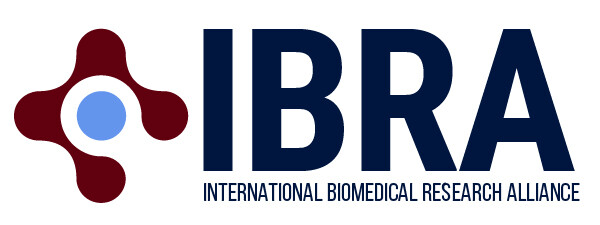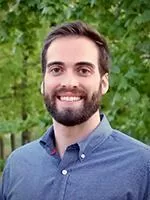
by Alex Ambrico | Jul 30, 2024 | Cambridge, News, NIH, OxCam, Oxford, Past Events
The Outstanding Recent Graduate Award recognizes the noteworthy and distinctive achievements of an individual who has graduated from the Scholars Program within the last two years. The honoree embodies the values of scientific innovation and collaboration leading to seminal biomedical discoveries at an early stage in their career.
This year’s nominees were: Aaron Bernstein, David Cruz Walma, Matthew Mulè, Olive Jung, and Sean Corcoran.
We are thrilled to announce that the 2024 Outstanding Recent Graduate Award is presented to:
Dr. Matthew Mulè
Matt conducted his PhD research under the guidance of John Tsang (NIH/Yale) and Ken Smith (Cambridge), making significant contributions to systems immunology. He developed the first computational framework dedicated to denoising single-cell protein expression data from multimodal single-cell technologies—a groundbreaking achievement that combined experimental insights with computational ingenuity. Matt also ensured the software, named “dsb,” was accessible to the community, complete with excellent documentation. As a result, the package has been widely adopted and cited in over 100 high-profile publications.
In addition to this, Matt led two other significant projects:
- He developed a multi-level framework to integrate human and single-cell variations, revealing a naturally adjuvanted baseline immune state in humans that predicts better vaccine responses.
- He integrated single-cell data with clinical information, discovering that iron dysregulation and inflammatory stress are linked to poor long-term outcomes in COVID-19 patients.
Matt has another paper under revision, where he uses multimodal single-cell analysis to identify a baseline predictor of adverse outcomes to cancer immunotherapy. As a superb MD-PhD student and a rising star in systems immunology, Matt is truly deserving of this award.
Currently completing his medical training at UNC, Matt was unable to join us for the Colloquium.
Congratulations, Dr. Matthew Mulè, on this well-deserved honor!

by Alex Ambrico | Jul 29, 2024 | Cambridge, News, NIH, OxCam, Oxford, Past Events
Recognized for Outstanding Service and Leadership within the Community
To be recognized for outstanding service and leadership within your community is an honor, but when this recognition comes from your peers – those who have the most focused view of you and your efforts – that is truly a distinction to be cherished.
The Roy and Diana Vagelos Leadership Award
The Roy and Diana Vagelos Leadership Award is presented to an individual who exemplifies the highest standards of leadership. The recipient is a role model for their peers and possesses the ability to inspire others to be better and do better by encouraging creativity, cooperation, promoting respect for others, emphasizing collaboration, and demonstrating initiative. This outstanding leader has a keen sense of organization and embodies leadership in all that they endeavor, combining clarity in thought with humility of character. The nominees for the 2024 Roy and Diana Vagelos Leadership Award are Hallie Gaitsch, Jasmine Mack, Kelsey Lowman, Ray Smith, and Yasemin Cole.
We are delighted to announce that the 2024 award goes to Hallie Gaitsch.
As President of this year’s SLB, Hallie Gaitsch has demonstrated exceptional leadership that goes beyond the duties of her role. She is diplomatic, organized, and clear in her goals, ensuring every SLB meeting is well-run, respectful, and productive. Hallie is trusted by the students for her approachability and is well-liked and respected by both peers and program leadership. She handles all her responsibilities with kindness, humility, and grace. Hallie is admired for her fair and non-judgmental approach, and her peers have learned a lot from her exemplary leadership.
“It is a great honor to receive this award from my peers. My time in the NIH OxCam Program has been transformative, both scientifically and personally. I feel very privileged to not only be a member of this community, but to give back to it through service on the Student Leadership Board. It is a credit to the Program that its leaders set aside regular, dedicated time to hear student concerns and to discuss strategies for continuous improvement. I would like to acknowledge my fellow SLB members, our Program administrators, the Executive Committee, and IBRA for their drive to make the NIH Oxford-Cambridge Scholars Program the best that it can be,” remarked Hallie.
IBRA and the NIH Oxford-Cambridge Scholars Program extends heartfelt congratulations to Hallie Gaitsch for her outstanding achievements. Her exceptional leadership and dedication make her a deserving recipient of the Roy and Diana Vagelos Leadership Award.
Stay tuned for more updates and news on outstanding leaders from the NIH Oxford-Cambridge Scholars Program. For more information on Hallie Gaitsch’s work and the Roy and Diana Vagelos Leadership Award, please visit our website.
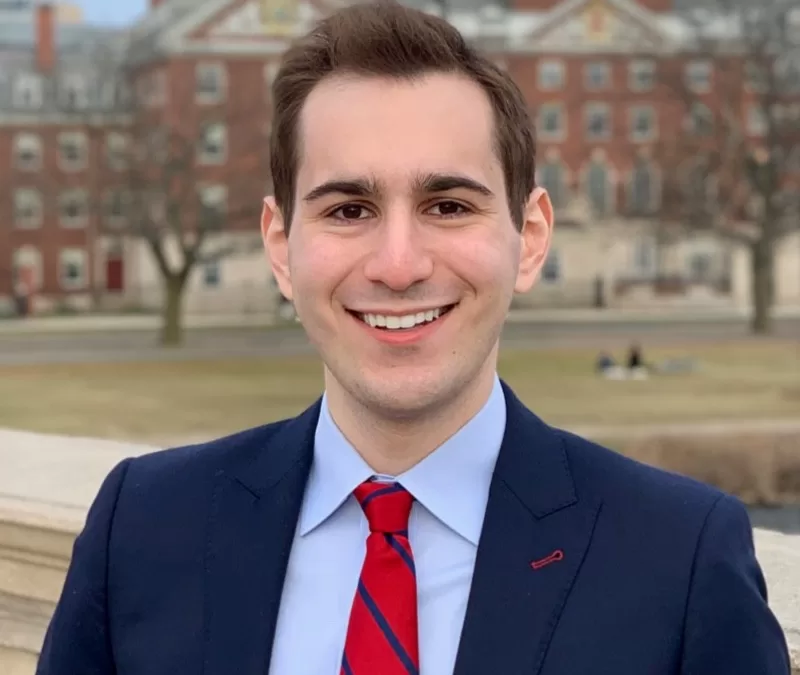
by Alex Ambrico | Jul 25, 2024 | Cambridge, News, NIH, OxCam, Oxford, Past Events
Endowed by NIH Oxford-Cambridge Scholars Program Co-Founder, Dr. Michael Lenardo, in loving memory of his brother, Gregory Paul Lenardo
We are delighted to announce Benjamin Lee as the recipient of the 2024 Gregory Paul Lenardo Basic Science Award for Discoveries in Cellular and Molecular Biology. This prestigious award recognizes groundbreaking discoveries in fundamental cellular, molecular, or genetic processes using model systems, advancing our scientific understanding of biological processes in higher organisms.
About the Award
The Gregory Paul Lenardo Basic Science Award is dedicated to honoring researchers who have made significant contributions to our understanding of cellular and molecular biology. Endowed by Dr. Michael Lenardo in loving memory of his brother, Gregory Paul Lenardo, the award reflects the commitment to fostering innovation and excellence in scientific research.
Meet the Winner: Benjamin Lee
Benjamin Lee has developed a pioneering “big data” strategy for viroid discovery, utilizing a completely novel approach that has significantly impacted the field. His groundbreaking work, published in Cell, has revolutionized our understanding of the number, diversity, and host ranges of viroid-like agents.
Key Achievements:
- Innovative Approach: Benjamin’s novel strategy for viroid discovery leverages big data, offering a fresh perspective and new methodologies in the field.
- Significant Impact: His research has dramatically expanded our knowledge of viroid-like agents, including their diversity and host interactions.
- Accessible Tools: Benjamin has created a comprehensive database and tools that are accessible to the wider scientific community, promoting further research and discovery.
- Published Work: His influential findings have been published in Cell, one of the most prestigious journals in the field of molecular biology.
- Future Contributions: Benjamin has been invited to submit a review on viroid discovery for the journal Nucleic Acids Research, indicating the high regard in which his work is held.
Recognizing Excellence
“I am deeply honored to receive the Gregory Paul Lenardo Basic Science Award. This research would not have been possible without the generous support of the NIH Oxford-Cambridge program and the tireless mentorship of my advisors at both NIH and Oxford, Eugene Koonin and Peter Simmonds. My work has opened a whole host of questions that I am eager to explore in my upcoming fellowship back at NIH in Bethesda. We have now shown that the world of viroids and viroid-like RNAs is much bigger than was previously known, but the full extent and diversity of these agents is clearly yet to be explored,” shared Benjamin.
Benjamin is currently focused on completing his degree and his dedication to advancing scientific knowledge and his innovative contributions make him a deserving recipient of the Gregory Paul Lenardo Basic Science Award.
IBRA and the NIH Oxford-Cambridge Scholars Program extend heartfelt congratulations to Benjamin Lee for his outstanding achievements. We also commend the other nominees, Hannah Duffy and Matthew Berns, for their exceptional contributions to the field of cellular and molecular biology.
Stay tuned for more updates and news on groundbreaking research from the NIH Oxford-Cambridge Scholars Program. For more information on Benjamin Lee’s work and the Gregory Paul Lenardo Basic Science Award, please visit our website.
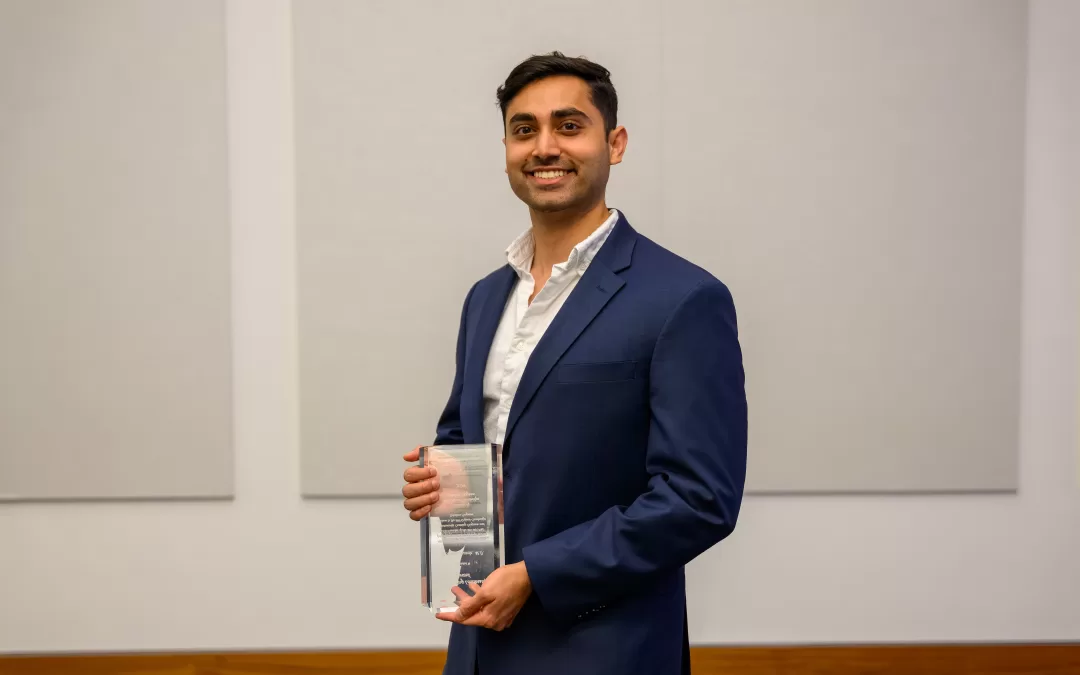
by Alex Ambrico | Jul 24, 2024 | Cambridge, News, NIH, OxCam, Oxford, Past Events
Endowed by Dr. John O’Shea, Co-Founding Faculty Member and Long-time Supporter of the NIH Oxford-Cambridge Scholars Program
We are thrilled to announce Asmay Gharia as the recipient of the 2024 John and Alice O’Shea Innovation Award for Novel Solutions in Biology or Medicine. This esteemed award recognizes groundbreaking discoveries that utilize new or unusual methods, paradigms, or approaches to solve critical problems in biology or medicine.
About the Award
Commencing in 2023, the John and Alice O’Shea Innovation Award has been endowed by Dr. John O’Shea, the Scientific Director of the National Institute of Arthritis and Musculoskeletal and Skin Diseases. This award honors discoveries of unusual importance, application, or magnitude that make significant contributions to the fields of biology or medicine through innovative approaches.
Meet the Winner: Asmay Gharia
Asmay Gharia has invented a groundbreaking method for cellular electroporation with the potential to revolutionize the field of biomedical science. His innovative work has already attracted significant interest and acclaim within the scientific community.
Key Achievements:
- Innovative Method: Asmay has developed a novel technique for cellular electroporation that promises to enhance the efficiency and effectiveness of gene modification.
- Industry Interest: A global leader in electroporation technology has expressed interest in licensing Asmay’s groundbreaking technology.
- Published Research: A manuscript detailing his work has been favorably reviewed by Science Advances, highlighting the significant impact of his research.
- Cancer Therapy Applications: Asmay aimed to develop a technique to more easily modify macrophages for cancer therapy applications. He successfully created a device that demonstrates efficient CRISPR-based gene perturbation in macrophage cell models and consistent primary cell transfection.
- Macrophage Polarization: His research has shown that specific gene perturbations using his device can induce pro-inflammatory or immunosuppressive macrophage polarization states in an in vitro tumor model, demonstrating its potential for advancing cancer therapies.
Asmay shared, “It is an incredible honor to receive the John and Alice O’Shea Innovation Award in recognition of my research in high-efficiency bioelectronic cell-engineering systems. My long-standing goal has been, and continues to be, reshaping manufacturing of personalized therapies to accelerate their development and promote accessibility. I would not have been able to pursue this dream without the opportunities provided to me through the NIH OxCam Program and could not have done this without the wisdom, guidance, and support of my supervisors Drs. Iain Fraser and George Malliaras.”
Recognizing Excellence
IBRA and the NIH Oxford-Cambridge Scholars Program extend heartfelt congratulations to Asmay Gharia for his remarkable achievements. His innovative contributions to cellular electroporation and cancer therapy applications make him a deserving recipient of the John and Alice O’Shea Innovation Award for Novel Solutions in Biology or Medicine.
We also commend the other nominees, Dalton Hermans, Henry Taylor, Jacob Gordon, Shreya Chappidi, Tung Nguyen, and Zoe Wong, for their exceptional contributions to the field of biology and medicine.
Stay tuned for more updates and news on groundbreaking research from the NIH Oxford-Cambridge Scholars Program. For more information on Asmay Gharia’s work and the John and Alice O’Shea Innovation Award, please visit our website.
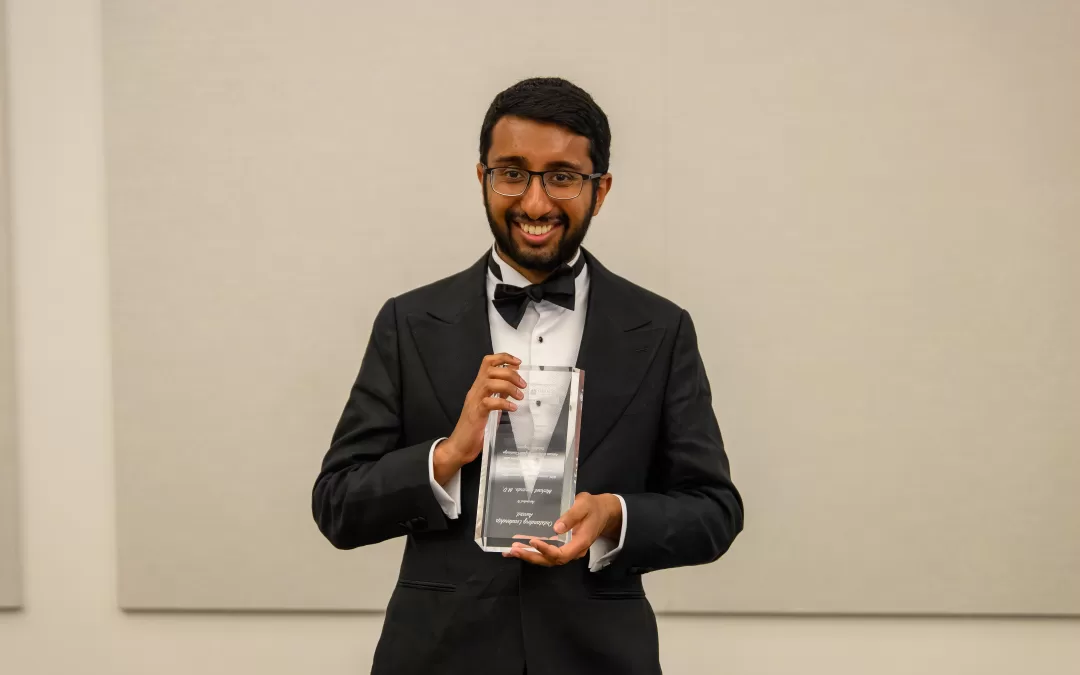
by Alex Ambrico | Jul 24, 2024 | Cambridge, News, NIH, OxCam, Oxford, Past Events
Endowed by Dr. Richard Siegel, Co-Founder and long-time Director of the NIH Oxford-Cambridge Scholars MD/PhD Program, and his wife, Vera Siegel.
We are proud to announce Sooraj Achar as the recipient of the 2024 Dr. Richard and Vera Siegel Translational Award for Advances in Medical Science. This prestigious award recognizes outstanding contributions in the field of medical science that translate fundamental discoveries from the bench to the bedside.
About the Award
The Translational Award for Advances in Medical Science, endowed by Dr. Richard Siegel and his wife, Vera Siegel, honors researchers who have made significant strides in bridging the gap between basic research and clinical application. This award celebrates advancements that have the potential to improve patient care and treatment outcomes.
Meet the Winner: Sooraj Achar
Sooraj Achar’s innovative work in the lab has led to remarkable advancements in the field of medical science. His contributions exemplify the essence of translational research, moving groundbreaking discoveries from the laboratory to clinical applications.
Key Achievements:
- Innovative Platform: Sooraj’s initial work involved designing and engineering a robotic/machine learning platform to study T cell activation ex vivo. This project was published in Science in 2022 and received the IBRA Innovation Award for Novel Solutions in Biology or Medicine.
- Advanced Research: Building on this success, Sooraj investigated the crosstalk between the endogenous T cell receptor (TCR) and the chimeric antigen receptor (CAR) in CAR-T cells. His research explored how TCR signals can be leveraged to enhance the specificity of CAR-T cells by engineering signal antagonism when interacting with self-tissues and synergism when targeting neo-antigens.
- Collaborative Effort: Sooraj’s research is characterized by its comprehensive, highly collaborative, and translational nature, making significant contributions to the field of immunotherapy and cancer treatment.
Sooraj commented, “I am honored to have been awarded the Dr. Richard and Vera Siegel Translational Award at the 2024 NIH Global Doctoral Partnerships Annual Workshop Awards Ceremony for my work on improving the precision of cancer immunotherapy. I would like to thank my mentors Dr. Gregoire Altan-Bonnet at the National Cancer Institute (NCI) and Prof. Michael Dustin at Oxford University, as well as my collaborators at the University of Montreal and the Pediatric Oncology Branch at the NCI, for their efforts in helping translate our biological discovery of T cell receptor mediated inhibition of chimeric antigen receptor activation into a commercially viable method of reducing off-target toxicity of healthy tissue during immunotherapy. It has been immensely gratifying to be able to work on a project that draws upon fundamental advances in theoretical and basic science to design more effective clinical therapeutics, and I firmly believe that this interdisciplinary, collaborative model of conducting research represents the future of biomedical science.”
Recognizing Excellence
IBRA and the NIH Oxford-Cambridge Scholars Program extend heartfelt congratulations to Sooraj Achar for his outstanding achievements. His dedication to advancing medical science and his innovative contributions make him a deserving recipient of the Translational Award for Advances in Medical Science.
We also commend the other nominees, Asmay Gharia, Dalton Hermans, James Anibal, Jasmine Mack, Stanley Fayn, and Zoe Wong, for their exceptional contributions to the field of medical science.
Stay tuned for more updates and news on groundbreaking research from the NIH Oxford-Cambridge Scholars Program. For more information on Sooraj Achar’s work and the Dr. Richard and Vera Siegel Translational Award for Advances in Medical Science, please visit our website.
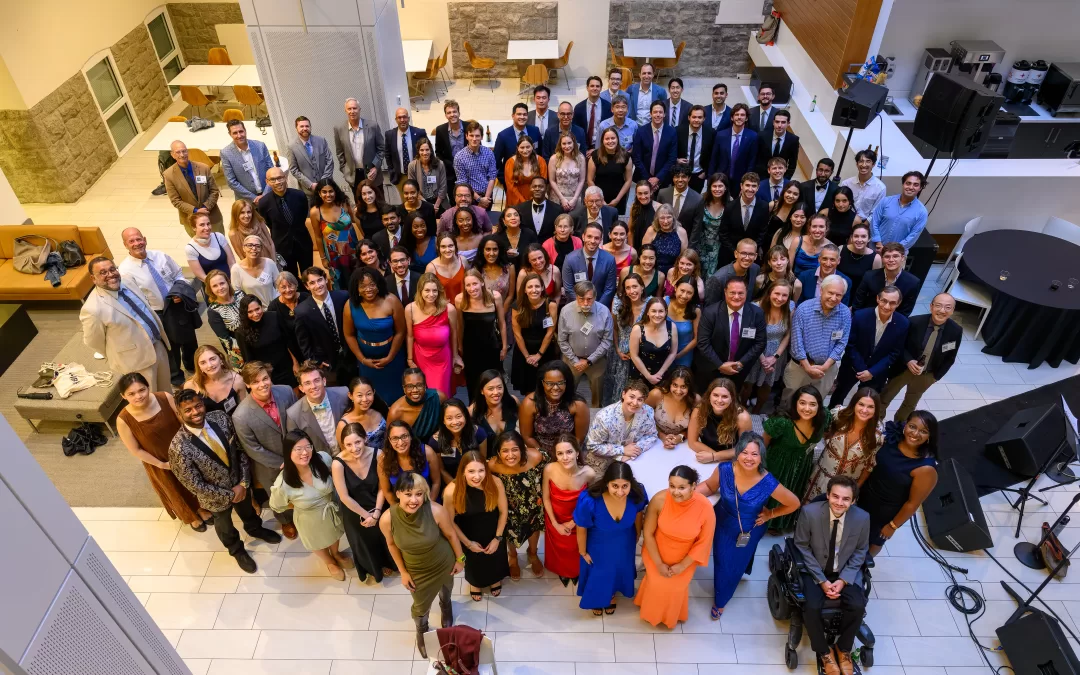
by Alex Ambrico | Jul 22, 2024 | News, Cambridge, Colloquium, NIH, OxCam, Oxford, Past Events
The 2024 NIH Global Doctoral Partnerships Research Colloquium, hosted by the International Biomedical Research Alliance and the NIH Oxford-Cambridge (OxCam) Scholars Program, from July 15-18 at the Washington College of Law, American University, Washington DC, was a landmark event for the biomedical research community. This year’s Colloquium brought together Scholars, Alumni, faculty mentors, Board Directors, and industry leaders for a week of engaging presentations, keynote talks, and networking opportunities.
The event commenced with Dr. Lyric Jorgenson, PhD, and staff from the NIH Office of Science Policy, who delivered an insightful Science Policy Address. Following this talk, Poorva Jain and NIH OxCam Scientific Director Mary Dasso, PhD, welcome guests and emphasized the importance of collaboration and innovation in biomedical research. Following the introductions, Research!America’s Jenny Luray, a leading voice in science policy, delivered an inspiring keynote address that highlighted the intersection of research, policy, and public health. The first day also featured Class of 2024 introductions and 2022 Scholar Oral Presentations on Immunology and Cancer. The day concluded with a Research Participants Perspectives Panel featuring NIH investigators, study participants, and family members of patients.
On the second day, the Class of 2023 opened the session with the three-minute thesis, with Scholar Jessica Phan being recognized for the best thesis talk. Ana Penman-Aguilar, PhD, MPH, and Keisha Ray, PhD, led a thought-provoking session on diversity, equity, and inclusion in biomedical research. This was followed by town hall discussions and poster sessions, where attendees explored innovative research presented by the Class of 2022. Scholar Stanley Fayn was named the best poster presentation winner. These sessions provided a platform for in-depth discussions and networking among participants.
The third day continued with Oral Presentations by the Class of 2022 with the topics of Cancer and Neuroscience as well as Computational Biology. Scholars Henry Taylor and Cristina Contreras Burrola were recognized for their outstanding presentations.
An alumni panel, featuring distinguished Alumni Jeanette Beaudry, MD/DPhil, Ryan Harrison, DPhil, Tamara Litwin, PhD, MPH, and Geoffrey Lynn, MD/DPhil (who recently joined the IBRA Board of Directors) shared their career journeys and insights with current Scholars. The day concluded with an elegant awards gala, where Michael Lenardo, MD, and Peter Marks, MD, PhD, delivered closing remarks, celebrating the achievements of the biomedical community.
Throughout the Colloquium, attendees had numerous opportunities for networking, skill development, and exploring career pathways. The event not only showcased the remarkable work of young researchers but also reinforced the importance of collaboration and community in driving scientific progress.
For more information about the event and upcoming activities, please contact Alexandra Ambrico at ajambrico@biomedalliance.org.

